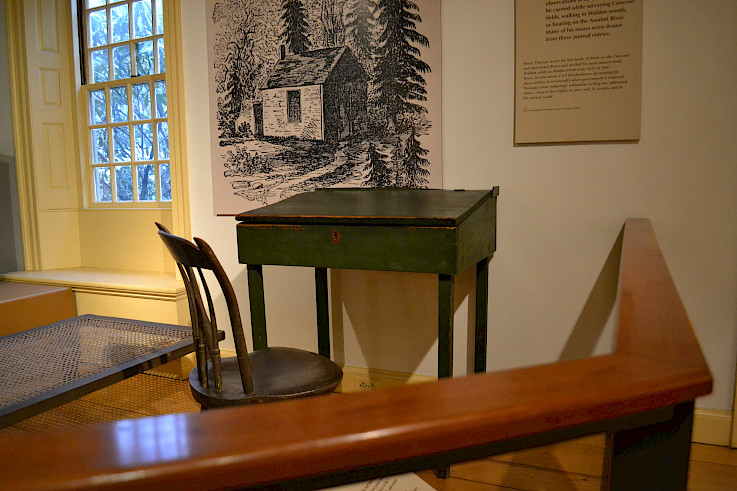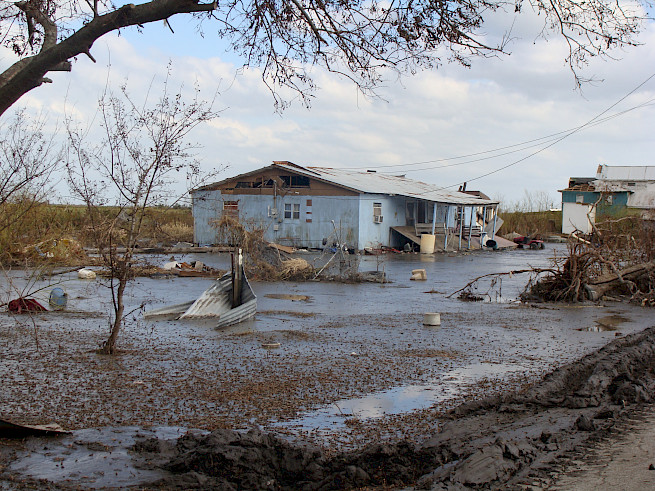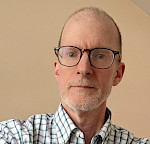Grappling with environmental stewardship and collective behavior in an increasingly chaotic world
John McQuaid · 6 commentsHow should societies manage the profit-driven economic systems that are systematically transforming the world – destroying the resources they depend on, damaging ecosystems, and causing widespread suffering? This is one of the central social and political dilemmas of the past two centuries. And the world seems to be always in a position of falling behind and trying to play catch-up on ever-larger scales, as the Anthropocene gallops onward. Currently, we face the prospect of runaway climate change. Climate impacts are escalating, and global systems may be reaching critical tipping points1 from which there will be no return. To address these problems on the global scale, there is a voluntary system of national carbon reductions – that is not yet working.
The tensions between capitalism and environmental stewardship, stretching across generations, was the principal theme in our class last week. Excerpts from Henry David Thoreau’s Walden2, Aldo Leopold’s A Sand County Almanac3, and Rachel Carson’s Silent Spring4 each stress aspects of this predicament from the vantages of the mid-19th and 20th centuries. There is a clear through-line of “brokeness” in the the modern world that has led to our current predicament.

Writing in the 1850s, Thoreau shows how various social forces, shaped largely but not exclusively by the demands of 19th century American capitalism, manifest in the daily lives of individuals. These demands both mold and degrade the quality of personal experience, putting people on endless treadmills of work and obligation in the name of earning a wage and accumulating wealth. Nature becomes a means to this end. Thoreau asks that his readers pause and reassess these demands by distant masters, and return to a direct engagement with nature. Leopold, writing nearly a century later, identifies the similar category error of treating nature or the environment as a source of economic resources, useful for extraction. Leopold argues for a basic recognition that the environment is not merely property but has value in itself, and humans do not stand apart but are embedded in ecosystems. Writing just over a decade later, Carson documents the terrible toll of various forms of chemical polluioin on animals and ecosystems – and the huge void in environmental oversight by governments that let it happen.
Certainly, a lot of progress has been made in the past 60 years in the United States and elsewhere, both in an emerging ethic of stewardship and in building systems of government oversight. But large gaps remain – in values, in capacities, in political clout – between the engines of global capitalism and those pushing to protect the environment. As came up in our discussion, these splits manifest at local, national, regional, and global levels. Sometimes they lead to a “tragedy of the commons” in which collective resources are destroyed by competing self-interests – yet sometimes they can be overcome5 through creative negotiation and collective political process.
But the accelerating speed of social and environmental change today seems to be outpacing these efforts – at least as far as climate impacts go. Now, we must not only figure out proper stewardship, but contend with chaos – rapid change, species die-offs, extreme weather, climate refugees.6 There are also frightening emerging challenges such as pandemics – which often have origins in the complex ecology7 of expanding “edges” between human settlement and perturbed wild areas.

Understanding such fast-moving changes is essential to building and maintaining environmental stewardship in a chaos era. One interesting recent attempt came with the 2021 publication of a paper in PNAS titled “Stewardship of global collective behavior”.8 The paper, by a group of researchers from a range of disciplines including biology, ecology, earth sciences, climate, and international relations, is a kind of manifesto to the academic and policymaking communities arguing for expanding the study of collective behavior and to prioritize it as a “crisis discipline.” “The basic debate is an ancient one,” they write. “Are large-scale behavioral processes self-sustaining and self-correcting, or do they require active management and guidance to promote sustainable and equitable wellbeing?” While there’s a substantial literature in economics and ecology on these questions, they say, this isn’t enough to contend with 21st century problems – in particular, the advent of the internet and increasingly networked societies motivates new, potentially dangerous, social dynamics (including the rapid spread of misinformation) that may cripple the capacity for collective action when it is needed most. (While, at the same time, nurturing a growing carbon footprint.9)

“Crisis discipline” is a term coined by the biologist Michael Soulé,10 considered the father of conservation biology (the original crisis discipline). Such approaches are aimed not just at building understanding, but addressing problems that demand immediate action, yet are poorly understood: “Crisis disciplines are distinct from other areas of urgent, evidenced-based research in their need to consider the degradation of an entire complex system—without a complete description of the system’s dynamics.”
In an interesting commentary on “Stewardship,” Robin Berjon, a computer scientist and vice president of data governance at the New York Times, notes how communications and media play an important, yet still poorly-understood role, in these urgent questions of collective behavior11: “The paper's core idea is straightforward: complex systems can be highly resilient to perturbation, but that resilience is finite. Once such a system is pushed outside of its homeostatic regime, it undergoes sudden, catastrophic, and irreversible loss of functionality. The deployment of internet technology is evidently a massive perturbation of our social dynamics — but we lack the intellectual tooling to analyse its effects as they are taking place.”
The specific problem Berjon addresses is the algorithmification of news and other media, in which decisions about content once made by people (writers, directors, editors, producers, et al) is increasingly made by algorithms that operate at greater scales and are created to maximize efficiency and profit. The problem, as he sees it, is that this simplifies media and information diets, and this in turn may cripple the capacity of democracies, in particular, to process information and devise solutions – particularly to urgent problems such as climate change. In essence, he wonders if the Internet may lead to dumber politics, and with it a breakdown in policy and response capacity: “In mediating so much of humankind's discovery through the tiny funnel of a handful of systems, we are creating an unprecedented impoverishment of our intellectual toolbox.”
As a journalist, I find these arguments particularly alarming given that they lie at the intersection of ecology, political behavior, and information. Just as the seeds for climate change were being planted in Thoreau’s day, and the warming process well underway a century later when Leopold and Carson were writing, whatever insane social-political-ecological disruptions await as the product of networked societies are probably already unfolding – and now only semi-perceptible. But of course, given the dangers that breakdowns in stewardship post, these questions only become more urgent.
References
- Lenton, T. M., Rockström, J., Gaffney, O., Rahmstorf, S., Richardson, K., Steffen, W., & Schellnhuber, H. J. (2019). Climate tipping points—Too risky to bet against. Nature, 575(7784), 592–595. https://doi.org/10.1038/d41586-019-03595-0
- Thoreau, H. D. (2018). Walden. Global Grey.
- Leopold, A. (1949). The Land Ethic. In A Sand County Almanac. Oxford University Press.
- Carson, R. (1962, June 16). Silent Spring – I. The New Yorker, 6/16/1962.
- Harvest Strategies: 21st Century Fisheries Management. (2019, November 6). Pew Trusts. https://pew.org/2pMr4K3
- Isle de Jean Charles Resettlement. (2021). Isle de Jean Charles. https://isledejeancharles.la.gov/
- Holmes, E. (2022, March 10). COVID-19—Lessons for zoonotic disease | Science. Science. https://www.science.org/doi/10.1126/science.abn2222
- Bak-Coleman, J. B., Alfano, M., Barfuss, W., Bergstrom, C. T., Centeno, M. A., Couzin, I. D., Donges, J. F., Galesic, M., Gersick, A. S., Jacquet, J., Kao, A. B., Moran, R. E., Romanczuk, P., Rubenstein, D. I., Tombak, K. J., Bavel, J. J. V., & Weber, E. U. (2021). Stewardship of global collective behavior. Proceedings of the National Academy of Sciences, 118(27). https://doi.org/10.1073/pnas.2025764118
- Swabey. (2021, August 11). Estimates of ICT’s greenhouse gas emissions might be way off the mark. Tech Monitor. https://techmonitor.ai/leadership/sustainability/estimates-of-its-greenhouse-gas-emissions-might-be-way-off-the-mark
- McNulty, J. (2020, June 23). Michael Soulé, father of conservation biology, dies at 84. UC Santa Cruz News. https://news.ucsc.edu/2020/06/soule-obituary.html
- Berjon, Robin. (2021, June 26). Stewardship of Ourselves. Robin Berjon. https://berjon.com/stewardship/?s=09
About the author
John McQuaid

John McQuaid is a PhD student in the University of Maryland Philip Merrill College of Journalism.
Next Post > Generating Collective Knowledge at the Potomac Open House
Comments
-
William Dennison 3 years ago
John, I wish that blogs were eligible for Pulitzer Prizes for you to add to your collection. I love your phrasing ". . . as the Anthropocene gallops onward.", ". . . a clear through-line to 'brokeness' . . .", ". . . algorithmification of news and other media . . .". Connecting the classic readings with the contemporary example of Louisiana climate refugees was nicely done, supported by arresting images of climate change impacts. The additional referenced material and concepts that you added to the assigned readings provided a deeper understanding of the environmental perspective on coupled human and natural systems. I also appreciate your reference to Michael Soule'. I had a chance to collaborate with Michael when I was in Australia and we co-authored a paper "The role of connectivity in Australian conservation" in Pacific Conservation Biology.
-
Veronica Lucchese 3 years ago
I really appreciate your style of writing. In my experience, I feel as thought most science papers or writings are very lengthy and repetitive. I feel like your journalistic style made every sentence integral and unique. I thought your point about the crisis discipline was interesting. I have a lot of young members in my family who have climate education built into all aspects of their education. Due to their location and cultural community, they are exposed to progressive curriculums that do not shy from environmental issues. Some trends I have picked up on and discussed with other youth educators is the idea of climate burnout. Unfortunately, the mainstream climate curriculum is not solution based and which is leading to a sense of hopelessness and disinterest in the youth. As a result, they rely more on media outlets (social media mainly) for information and messaging about global issues. I wonder what roll the education system plays in the intersectionality of environmental science and media?
-
Colin Vissering 3 years ago
John - really well written and interesting blog, and I really enjoyed your focus on crisis discipline and the issues of the social dynamic related to addressing today's ever worsening climate issues. This is of particular interest to me as I continue to work on long-term disaster recovery efforts and face the challenges of community and individual resistance to change, even in the face of repetitive disaster events. As you note, in the mid-19th Century, Thoreau provided a basis for a different way of thinking regarding our relationship to our environment, and Leopold and Carson provided strong economic and ecological arguments to change our environmentally damaging behavior a century later. However, society still struggles with embracing these ideas and translating them into action and the concept of “tragedy of the commons” - in which collective resources are destroyed by competing self-interests - seems to really be at the heart of our struggles in coming up with universally supported and funded actions to solve our most serious environmental problems. Let's hope we find a way to replenish our "impoverished toolbox"!
-
Mary Efird 3 years ago
John, I love the way you juxtapose your discussion of the Thoreau, Leopold, and Carson readings with an analysis of the 2021 PNAS stewardship article. I think this is an insightful coupling that shows how environmental thought and the way in which it is discussed has evolved over time. I also really like how you address your positionality as a journalist and the unique perspective this grants you about the way in which climate change is handled in the media.
-
Meghna 3 years ago
John, I really enjoyed reading your blog. I found it even more interesting as it was written from a journalist’s perspective. The concept of “brokenness” was pointed out really well with regards to capitalism and environmental stewardship. I really liked how you used the readings to enforce these ideas. Also, You mentioned in the beginning, “there is a voluntary system of national carbon reductions - that is not yet working.” For many years, nations have been setting goals and targets to reduce carbon emissions, but no matter how many goals we set, we are still facing the consequences of climate change. Sure, the reductions are becoming more prominent, but so are the effects of climate change, many of which resulted from rapid urbanization and industrialization. Some are experiencing them more frequently than others, which is another reason the “crisis discipline” should be addressed at a deeper level.
-
Sarah Pickens 3 years ago
Thank you for this insightful blog. I want to call out the very first sentence - "How should societies manage the profit-driven economic systems that are systematically transforming the world – destroying the resources they depend on, damaging ecosystems, and causing widespread suffering?" I believe bold moves provide hope for a better future. Bold moves by individuals, yes, but bold moves by governments, companies, and regulation authorities, even better. The recent action of Patagonia to give away 100% of non-voting stock to a trust dedicated to defending nature, valued at approximately $100 million annually, is one such bold move (see https://www.washingtonpost.com/climate-solutions/2022/09/14/patagonia-yvon-chouinard-climate-change/). Patagonia founder Yvon Chouinard states, "Earth is now our only shareholder." How awesome is that?? The post article states "Some retail industry experts said the move could reverberate beyond a single company." We need more Chouinards and Patagonias to step up, and soon.